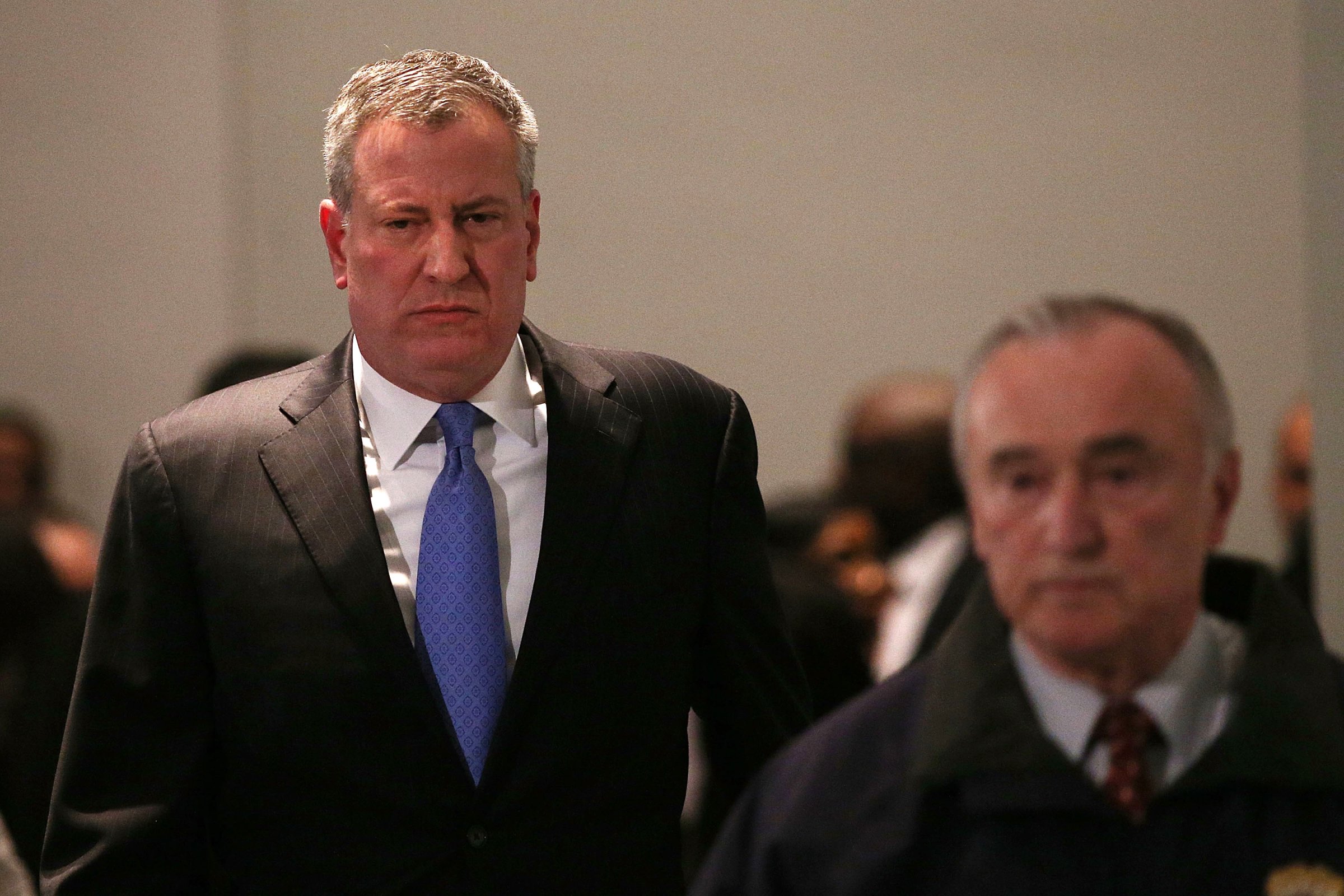
In 1994, during Bill Bratton’s first stint as Gotham’s Police Commissioner, he and then Mayor Rudy Giuliani transformed law enforcement with “broken windows” policing. It led to unprecedented drops in crime. Twenty years later, after a very successful run as the head of the once troubled Los Angeles police department, Bratton has returned to initiate a new set of reforms designed to adjust policing to the decline in crime he initiated. But under the current New York Mayor Bill de Blasio, Bratton’s modifications, designed to draw the police and minority communities closer together in reducing crime, have run into rough political headwinds.
Until the execution of two police officers—one Asian, the other Hispanic as representatives of the “white racist cops”—Mayor Bill de Blasio, a supporter of “Occupy New York,” was able to ride two horses simultaneously. He backed both Bratton’s updating and easing of “broken windows” and maintained a close political relationship with racial racketeer Al Sharpton who assailed those same policies. Similarly, during the protest marches set off by the no-indictment verdicts in the Michael Brown and Eric Garner cases, de Blasio has vigorously defended the active policing of low-level crime which is the key to broken windows even as he identified with his core supporters marching in protest against those very policies. The ill-informed marchers representing “Occupy on Parade,” seemingly unaware of either Bratton’s reforms or the fact that police killings of African-Americans in Gotham were at an historic low, denounced the police as racist. They called for an end to “broken windows” on the inverted assumption that active policing produces crime. Bratton, judicious as always, allowed the protesters to vent with a minimum of police interference in the expectation that the ranters would burn themselves out before there was real trouble.
It was a reasonable gamble but one that he would lose.
De Blasio’s balancing act began to unravel a week before the execution of the two cops. Echoing the chant of the demonstrators who disrupted the 1968 Democratic National Convention, protesters taunted two cops who refused to take the bait with cries of “The Whole World is Watching.” It was. And while it was watching two activists, a City University of New York adjunct professor and an organizer for the Service Employees International Union (SEIU had been key to the mayor’s election) punched two police lieutenants who had made every effort to avoid a confrontation.
The assault on the officers was a “broken window” of sorts but de Blasio responded only with anodyne words. The police union reacted to the mayor with scorn and dismay. They warned that marchers chanting “What do we want? Dead cops! When do want it? Now!” could only come to grief. The police union asked their members to sign a form asking de Blasio not to attend their funerals should they be killed in the line of duty.
Days later the witches brew of invective boiled over. Twenty-eight year old Brooklyn born Ismaaiyl Brinsley assassinated two cops. According to his Facebook page, Brinsley, as ill-informed as the marchers, committed the murders in the name of avenging the supposed white racism that had killed Michael Brown and Eric Garner.
The hyperbolic rhetorical response of the police unions has been to accuse de Blasio of “having blood on his hands.” The police turned their backs on the mayor when he visited the mortally wounded cops when they were still in the hospital. The practical response of police unions, which leaves both Bratton and de Blasio in the lurch and the city’s civilians in danger, has been to call for a “slowdown.” The union is telling its members that “no matter what the opinion of the patrol supervisor don’t make arrests unless absolutely necessary.”
The upshot is that de Blasio can’t continue his straddle. If he hopes to govern effectively he needs the cooperation of the police. De Blasio is comfortable with the protesters; until recently he was one of them. He’s uncomfortable with cops, but that needs to change. After twenty-years of sharply reduced crime, the entire city—that is people of all hues and interests—are emotionally averse to returning to the bad old days when you had to listen for footsteps behind you when you were walking at night. De Blasio needs to anger his activist confreres, if only temporarily, by sitting down with the police union, whose contract is not incidentally pending, and working out an understanding. If not, then the reasoned reforms Bratton has proposed will also fall victim to the ravings of the know-nothing protesters.
Fred Siegel is a senior fellow at The Manhattan Institute and Scholar in Residence at St. Francis College.
READ NEXT 7 Arrested in New York Charged With Threatening Police
More Must-Reads From TIME
- Dua Lipa Manifested All of This
- Exclusive: Google Workers Revolt Over $1.2 Billion Contract With Israel
- Stop Looking for Your Forever Home
- The Sympathizer Counters 50 Years of Hollywood Vietnam War Narratives
- The Bliss of Seeing the Eclipse From Cleveland
- Hormonal Birth Control Doesn’t Deserve Its Bad Reputation
- The Best TV Shows to Watch on Peacock
- Want Weekly Recs on What to Watch, Read, and More? Sign Up for Worth Your Time
Contact us at letters@time.com